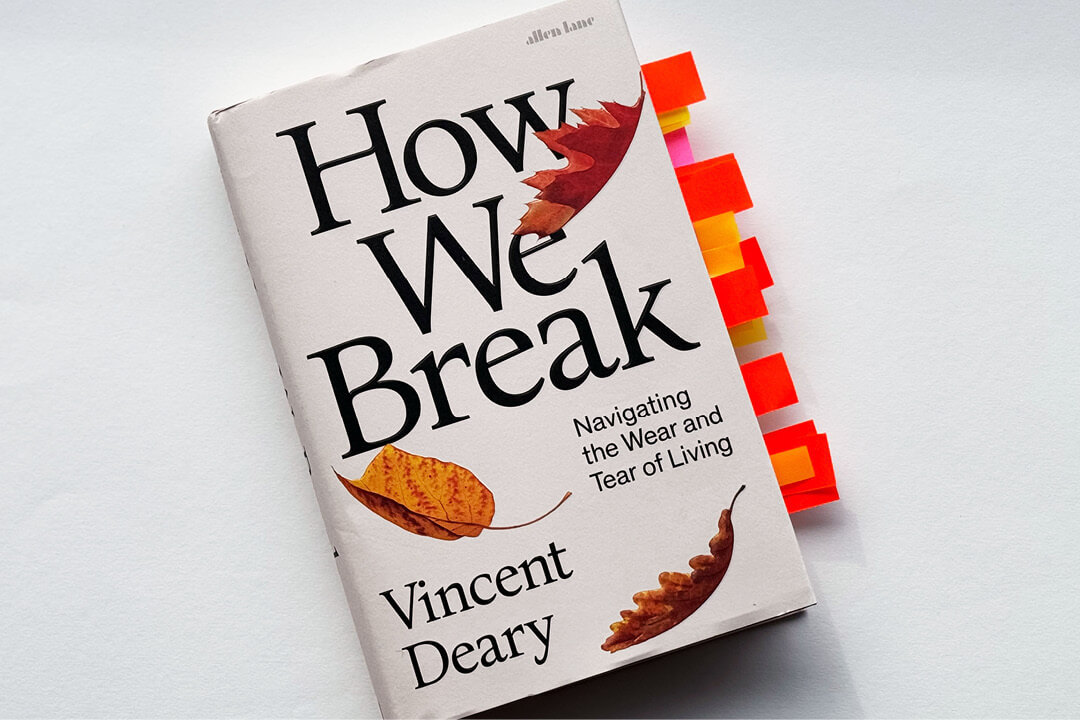What life does to us and what we make of it. The GM book tip.
For most of us, according to author Vincent Deary, it’s not big events that get to us, but many small events at the same time
A quietly intelligent book – not a loud guidebook
The strengths of this book: An intelligent text with many cross-references, formulated in a way that everyone can understand, which describes how we break down.
The author, Vincent Deary, a psychologist and professor at Northumbria University in Newcastle, believes that we all break. Sooner or later. From his professional practice in an English NHS clinic for fatigue, he knows the very different personalities of patients.
He vividly describes the path to breaking as initially a slight inner tremor. The trembling is triggered by a number of events that occur in parallel over a relatively short period of time.
What leads to this
For most of us, each event on its own is not an exceptionally great misfortune or trauma. It is the addition of the events that is decisive.
Starting with the negative background noise of social and political events, plus perhaps a superior who shows no empathy or respect and/or the illness of a relative – the crucial sum is reached all at once.
Especially as we continuously absorb moods and impressions and store experiences throughout our lives.
At some point the reservoir is full and a breakdown occurs, which may or may not end in a serious illness.
The reaction of withdrawal is typical. Hobbies or other activities that were previously enjoyable lose their appeal and are no longer enjoyable. There is a sense that a limit has been reached and many people consciously or unconsciously withdraw at this moment. For many, the withdrawal is enough to keep them from breaking. Some withdraw for a long time or forever.
An opportunity for reorientation
Breaking up also represents an opportunity to change one’s own life. But here, too, the psychologist Deary remains pleasantly realistic. He does not tell us that “anything is possible”, but rather that nothing is more difficult for us humans than to change. The desire alone is usually not enough; breaking things can open a window to change.
Why do we recommend this book?
“How we break” is not a simple how-to book on self-optimization. It is a vividly written, intelligent reference book for the layperson that reveals important connections that can be learned from.
The author uses personas he has come to know in the course of his clinical practice to explain life stories in which a break-up occurred.
He describes in detail his mother Isobelle, who for decades was unable to come to terms with the fact that she had chosen the wrong path in life and died as a result, as well as his own fears of having to talk to strangers.
The examples make the book very lively and vivid, without it being a mere book of case studies.
Trilogy
“How we break” is part of a planned trilogy. The first part was “How we are”. The book is not a prerequisite for understanding the present book. The author attempts to summarize the first part of the trilogy in the first sixty pages. By then we had almost put the book down and not recommended it.
But from page 61 onwards, the book plays to its strengths and remains exciting right to the end. At the end, the author lists what he considers to be some important questions that are worth addressing in order to assess which events influence us and to what extent. Factors such as our attitude to work, the pleasure we can derive from our immediate local environment and much more.
Part III will hopefully appear soon
The third part of the trilogy is called “How We Mend”. This can be seen as a cliffhanger, because who isn’t interested in what we can do to calm and heal the tremors again?
Just dealing with the topic of how we break up has a therapeutic effect. We recognize ourselves and our environment in the people and their issues. This alone is worth the investment in the book, which we wish many readers. The objective, reserved author, who puts his work before his person, deserves it.
#Advertising #ProductPlacement #IndependentRecommendation #BecauseWeLoveIt
Photography © GloriousMe




